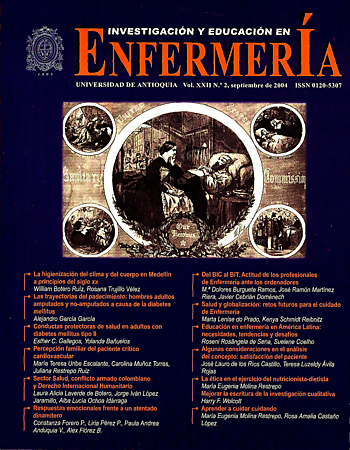Health protective behaviors in adults with type II diabetes mellitus
DOI:
https://doi.org/10.17533/udea.iee.2955Abstract
The purpose of this research was to determine the effect that diet and exercise have as protective conducts on glycemic control of adults with type 2 diabetes (DMII); as well as to identify the explanatory capacity that affective and cognitive variables have on diet and exercise. The study was carried out in two hospitals, one public and one private, on August, 1999. The theoretic framework of the study includes some of the concepts posited in the Model of Health Promotion.
The descriptive estudy was undertaken with 120 adults of both sexes, who were recruited intentionally from the patients in the control appointment. The data were gathered through personal interview, were anthrophometric measures were also taken. These included: weight, height, glycosilated hemoglobin. Four questionnaires were also filled up. The analysis was quantitative.
The results showed a significant percentage of obese people (62%), and lacking in glycemic control (42%). The affective variables did influence protective behaviors (F= 5.2, p <.00, R2 = 15%); however they did not affect glycemic control. Age and years with DMII accounted for an 18.5% variation in the levels of glycosilated hemoglobin, indicating there are other variables, not measured in this study. In summary, the variables family support, environmental barriers and the perceived benefits, predict the protective conducts of diet and exercise of the adults diagnosed with DM.Key Words: diabetes mellitus, prevention and control, dietherapy, familiar care, physical exercise, type II diabetes
Downloads
Downloads
Published
How to Cite
Issue
Section
License
Derechos de propiedad / Direitos de Propriedade
English: If the article is accepted for publication, all copyright will be of exclusive property of Investigación y Educación en Enfermería. The text and the graphics included in the publication are exclusive responsibility of the authors and not necessarily reflect the thought of the Editorial Committee.
Español: Si el artículo es aprobado para publicación, todos los derechos son de propiedad de Investigación y Educación en Enfermería. El texto y las gráficas incluidas en la publicación son de exclusiva responsabilidad de los autores y no necesariamente refleja el pensamiento del Comité Editorial.
Português: Se o artigo for aceito para publicação, todos os direitos autorais serão de propriedade exclusiva de Investigación y Educación en Enfermería. O texto e os gráficos incluídos na publicação são de responsabilidade exclusiva dos autores e não refletem necessariamente o pensamento do Comitê Editorial.















